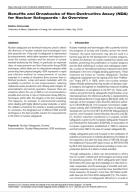Details
- Identification
- ISSN: 1977-5296, DOI: 10.3011/ESARDA.IJNSNP.2023.6
- Publication date
- 14 December 2023
- Author
- Joint Research Centre
Description
Volume: 65, December 2023, pages 63-73
Authors: Matteo Bolzonella
Politecnico di Milano, Department of Energy, Via Lambruschini 4, Milan, Italy, 20156
Abstract: Nuclear safeguards are technical measures used to detect the diversion of nuclear material and technologies from their peaceful use. A key trait of safeguards is represented by measurements, which allow operators and inspectors to verify the nuclear activities and the amount of nuclear material declared by the States. In particular, an important class of measurements are Non-Destructive Assay (NDA) techniques, which allow one to characterize samples while preserving their physical integrity. NDA represents a rapid and effective method for measurements of nuclear materials in a variety of situations (from process lines to finished products, scrap and waste materials), with the possibility to perform on-site measurements, reducing radioactive waste production and offering wide margins for automatization and remote operation. However, there are situations where the use of NDA is not recommended or possible and one has to rely on Destructive Assay (DA) (i.e., techniques which alter the integrity of the item analysed). This happens, for example, in environmental sampling, when dealing with highly diluted nuclear materials, or when the radiation emitted by the sample is weakly penetrating. In conclusion, the integrated use of different NDA and DA techniques is the best possible solution for measurements in the frame of nuclear safeguards.
Keywords: Nuclear Safeguards, Nuclear Instrumentation, Nuclear Measurements, NDA techniques
Reference guideline:
Bolzonella, M. (2023, December). Benefits and Drawbacks of Non-Destructive Assay (NDA) for Nuclear Safeguards – An Overview, ESARDA Bulletin - The International Journal of Nuclear Safeguards and Non-proliferation, 65, 63-73. https://doi.org/10.3011/ESARDA.IJNSNP.2023.6

